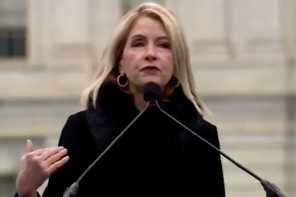Is secularism on the brink? Of collapse? Of wild success? Or, more modestly, of at least starting an essential conversation?
That was the subject of a conference last week at Georgetown University, Secularism on the Edge, organized by Jacques Berlinerblau, the director of the university’s Program for Jewish Civilization and author of the book, How to Be Secular. Berlinerblau’s central argument is that secularism has a robust history in the United States, but that it needs to “check into rehab.” As Berlinerblau told me when we discussed his book on Bloggingheads, secularism, as a social movement and political worldview, has been in a downward trajectory over recent decades in the United States. In his book, Berlinerblau offers a “12-step program” for a secularist movement to revitalize itself.
A crucial aspect of any secular renaissance, he argues in his book and argued last week, is correcting secularism’s sullied reputation. Last week’s conference was intended, Berlinerblau said, to “destigmatize secularism.” Berlinerblau is a critic of the influence of the New Atheists; he thinks secularism gets a bad rap because of the wide misperception that secularism is anti-religion. He’s an advocate of an accommodationist approach to church-state separation, as opposed to a strict separationist approach. That’s not his ideal, but his concession to the erosion of church-state separation over the past several decades and what he thinks is achievable in the current climate.
One of the most heated moments took place when Phil Zuckerman, a sociologist at Pitzer College and a founder of the school’s new major in Secular Studies, took issue with Berlinerblau’s criticism of Michael Newdow, the activist best known for his unsuccessful attempts to have “under God” in the pledge of allegiance declared unconstitutional. One person’s annoying and counterproductive gadfly is another person’s hero.
Zuckerman is at work identifying the range of secular belief, lifestyle, and political activism. Secularism is hard enough to define as an idea (is it the absence of religious belief? a commitment to disentangling religion and state?) but defining secular people might be even harder. While some are affirmatively anti-religion, others are merely disinterested, or as Zuckerman likes to say, they like skiing or hiking on the weekends rather than going to church, and don’t really give it another thought. He points out that secular people fall on a continuum, with some completely rejecting religion and others accepting pieces of religious thought or practice in their lives. (And obviously, there’s another category of very religious people who favor a completely secular state.)
Zuckerman points to the three Bs — belief, behavior, and belonging — of being secular, or not. You might not believe in God, but you might go to a house of worship for belonging. You might not believe in God, but you still light candles or celebrate holidays. In other words, it’s complicated.
When we talk about the “Nones” we frequently are talking in vast generalities and with inadequate terminology. For the time being, at least. Changes are unquestionably happening, and one would hope along with them, better ways of accurately describing them.
As a political reporter, though, I’m more interested in how secular people engage politically, so I asked Zuckerman if, based on his work, he thought many secular people were concerned about, for example, constitutional issues with President Obama’s Office of Faith-Based and Neighborhood Partnerships. Zuckerman, who has spent much time studying and interviewing secular people, said he thought very few of them were particularly engaged in these kinds of issues. Yet these issues have been a focal point for secular political activism during Obama’s presidency.
If secularism is a lifestyle more than a political movement, what does that mean for secularists who are political active? And for secularism as a political movement to counter the Christian right? What happens if the Christian right activists remain intensively politically engaged, yet the seculars (while growing) are out skiing?
One thing is clear, though: the rise of the “nones” does not mean either the decline of traditionalist religion as a political force, or the defeat of politicized religion as a movement. And whether it does mean either of those things in the long term is a lot more complicated than we think.




